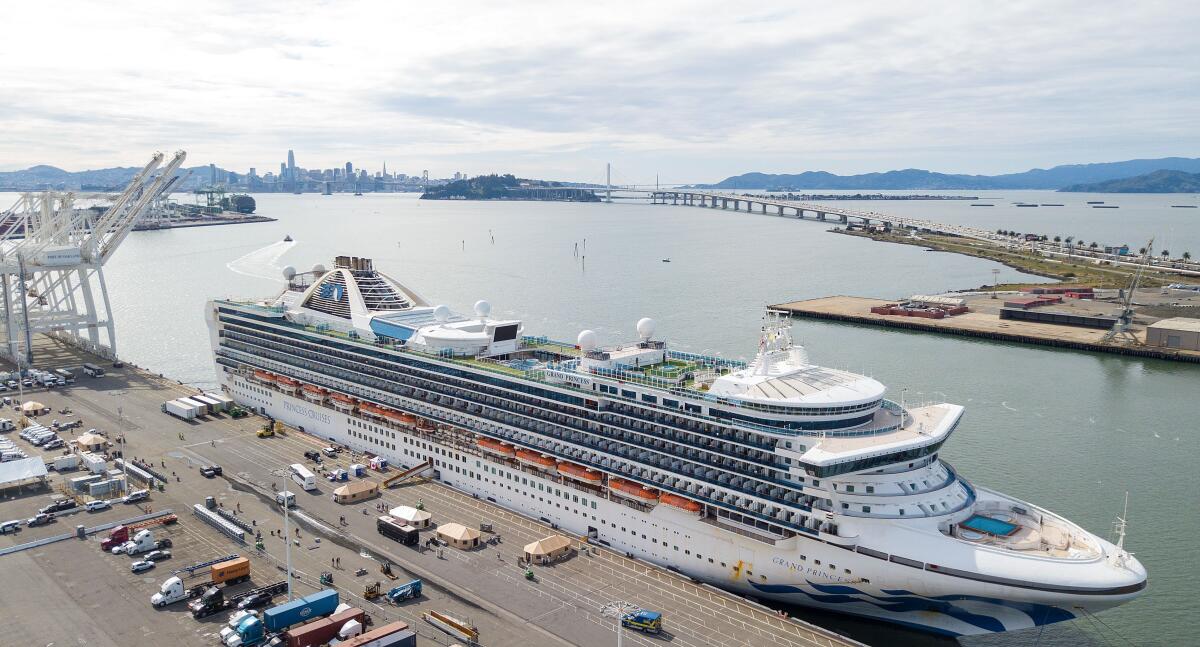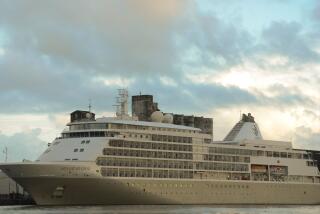Will the coronavirus outbreak sink the cruise industry?

- Share via
With hopes of tapping into a market of up to 83 million passengers, the world’s largest cruise company three years ago launched a new ship built specifically for Chinese vacationers.
The Majestic Princess, operated by a subsidiary of Carnival Corp., featured 1,780 cabins, 19 decks, an atrium and nearly 1,100 square meters of luxury boutiques, representing the largest shopping space at sea.
But the ship is now docked in Singapore, with its next 13 cruise trips canceled.
With China representing ground zero for the outbreak of the deadly coronavirus and thousands of cruise ship passengers forced to undergo extra health screening or a quarantine in Oakland, the cruise industry is reeling, facing its biggest crisis in decades.
The dilemma grew worse over the weekend with the U.S. State Department recommending that Americans, particularly travelers with underlying health conditions, avoid cruise ships. The Centers for Disease Control and Prevention said “a cruise-ship environment” could increase the risk of infection.
“It’s horrific,” said Carl Winston, director of the L. Robert Payne School of Hospitality & Tourism at San Diego State University. “I can’t imagine a single industry being called out like that.”
Gloria Guevara Manzo, president and chief executive of the World Travel and Tourism Council, chimed in on the crisis, saying she disagrees with the State Department’s recommendations against cruising, saying sailing on a cruise ship is just as safe as visiting a movie theater or a sports stadium. She said she would have preferred that the State Department had only warned people with underlying health conditions to stay home.
The blow from the outbreak could be the most devastating in years, possibly surpassing the drop in passenger demand when the Costa Concordia sank off the coast of Italy in 2012 and the Carnival Triumph was left floating powerless in the Gulf of Mexico after an engine fire the following year, according to Winston and other experts.
Shares of the world’s largest cruise companies — Carnival Corp., Royal Caribbean International and Norwegian Cruise Lines — dropped as much as 26% Monday, after several weeks of declines as the virus’ toll continued to grow.
The effect will also include the added costs of the new enhanced cleaning procedures adopted on most cruise lines, including more frequent cleaning of hard surfaces, and the cost to defend against lawsuits filed by passengers who have been stuck on delayed or quarantined ships.
Moody’s Investors Service lowered its outlook for the lodging and cruise industry last week to “negative” from “stable,” saying both industries face revenue losses in 2020 if the outbreak is not contained.
“If COVID-19 confirmed cases continue to rise in North America, no lodging or cruise company could be immune to financial consequences,” Moody’s said in a report Friday.
If travelers do abandon cruise trips, experts say it is not clear how long the cruise industry can withstand the revenue loss before turning to dramatic cost-cutting measures such as layoffs.
“The key question is what is their staying power,” Winston said. “How much cash do they have in the bank to stay afloat?”
Carnival, the world’s largest cruise company, reported net income of $3 billion last year, compared with $3.2 billion in 2018.
Travel agencies say most of their clients who had previously booked cruise trips — even river cruises in Europe — are now postponing those trips for several months instead of canceling them altogether.
“They are just moving them down the line,” said Jay Johnson, owner of Coastline Travel Advisors in Garden Grove.
The outbreak comes after five or six years of growing profits and bookings for the cruise industry. Before the outbreak, a trade group for the cruise industry predicted 32 million passengers would sail on cruise ships worldwide in 2020, up from 30 million in the previous year.
To meet the increasing demand, the world’s cruise companies were scheduled to launch 19 new ships in 2020, for a total of 278 cruise ships registered as members of the Cruise Lines International Assn. The industry supports nearly 1.2 million jobs, generating $50.2 billion in wages and salaries, according to the trade group.
After the capsizing of the Costa Concordia off Italy’s Tuscan coast and the fire on the Carnival Triumph, demand for cruise trips slowed to about 2% to 3% growth per year, down from the industry’s typical 7% annual increases.
Hoping to tap into a surging middle class in China, several cruise companies began in 2016 to add lines to serve Asian markets. Some cruise lines even revamped their ships to better serve Chinese customers. Royal Caribbean’s Quantum of the Seas swapped out a Johnny Rockets retro burger joint for a noodle restaurant and replaced the duty-free shop with a luxury leather boutique. The 1,100-foot ship was relocated from New Jersey to Shanghai as part of the effort to attract new passengers.
But in late January, when the scope of the coronavirus outbreak became clear, cruise lines started to cancel sailings to and from mainland China and began to restrict passengers who had previously visited China, South Korea, Italy and other regions hit hard by the outbreak.
Despite the cancellations, industry experts say that cruise prices have not dropped significantly. But Carnival Cruises recently offered up to $200 in “credits” that passengers can spend on ships if they keep their reservations through May 31.
Cruise lines are reluctant to lower trip prices because they can’t raise them back too drastically after the crisis has passed, for fear of scaring off potential customers, according to industry experts.
Stewart Chiron, who reviews cruises on his website cruiseguy.com, said the coronavirus outbreak may be the worst blow that the industry has seen. But he noted that unlike the hotel industry, cruise lines can speed up the recovery by redirecting ships to new destinations that are not as heavily hit as China or Italy. And he added that cruise passengers are typically very loyal customers and are likely to return to cruising after the shock of the outbreak wears off.
“It’s inevitable that the industry will rebound and persevere,” he said. “It’s a resilient industry.”
Johnson of Coastline Travel Advisors said many cruise companies are waiving penalties they usually charge for passengers who reschedule a booked trip. He expects that cruise lines will eventually offer discounts to entice travelers back to the water.
“There will be a lot of inventory and the big discounts will come in the fall,” he said.
More to Read
Inside the business of entertainment
The Wide Shot brings you news, analysis and insights on everything from streaming wars to production — and what it all means for the future.
You may occasionally receive promotional content from the Los Angeles Times.











